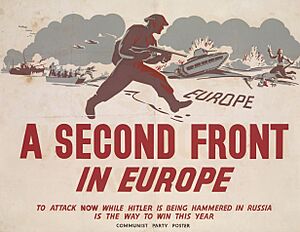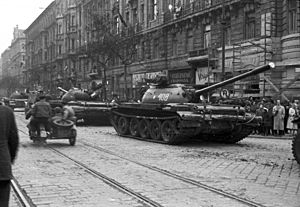Communist Party of Great Britain facts for kids
Quick facts for kids
Communist Party of Great Britain
|
|
|---|---|
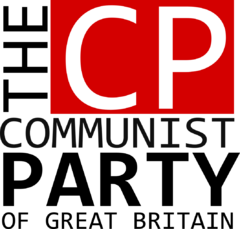 |
|
| Abbreviation | CPGB |
| General Secretary |
|
| Founded | 31 July 1920 |
| Dissolved | 23 November 1991 |
| Merger of |
|
| Succeeded by |
|
| Headquarters | Marx House, Covent Garden, London |
| Newspaper |
|
| Student wing | Communist Students |
| Youth wing | Young Communist League (YCL) |
| Membership |
|
| Ideology |
|
| Political position | Far-left |
| International affiliation | Comintern |
| Channel Islands Affiliates | Jersey Communist Party Communist Party of Guernsey |
The Communist Party of Great Britain (CPGB) was once the biggest communist group in Britain. It started in 1920 when several smaller groups joined together. Many miners became members during the 1926 general strike. In 1930, the CPGB started its own newspaper, the Daily Worker. This newspaper was later renamed the Morning Star in 1966.
In 1936, CPGB members helped organize resistance against the British Union of Fascists at the Battle of Cable Street. During the Spanish Civil War, the CPGB worked with the Soviet Union. They helped create the British Battalion of the International Brigades. A party activist named Bill Alexander led this group.
During World War II, the CPGB's stance on the war changed. It depended on whether the Soviet Union was involved. After the war, the party's membership grew a lot. It reached its highest popularity. Many important CPGB members became leaders in Britain's trade unions. These included Jessie Eden, Ken Gill, and Thora Silverthorne.
The CPGB also supported racial equality and anti-colonialism. This attracted many black activists. Some notable members were Claudia Jones, who started London's Notting Hill Carnival, and Len Johnson. In 1956, the party lost many members. This happened because it supported the Soviet Union's actions in Hungary. In the 1960s, CPGB activists supported Vietnamese communists in the Vietnam War. In 1984, Mark Ashton, a youth leader, founded Lesbians and Gays Support the Miners.
The Soviet Union funded the CPGB from 1956 until the late 1970s. The party was officially dissolved in 1991. This happened after the dissolution of the Soviet Union. Its leaders formed a new group called the Democratic Left. A different group, the Communist Party of Britain, formed in 1988. It still exists today.
Contents
What was the Communist Party of Great Britain?
The Communist Party of Great Britain (CPGB) was a political party in the United Kingdom. It aimed to create a communist society. This means a society where everyone is equal and resources are shared. The party was active for over 70 years.
How the Party Started
The CPGB was formed in 1920. This happened after the Third International called for communist parties worldwide. It was a merger of several smaller groups. These included the British Socialist Party and the Socialist Labour Party. Many people who wanted to stop the war in Russia also joined.
One important question was whether the party should work within the existing political system. Some members, like Sylvia Pankhurst, did not want to work with Parliament. They felt it would make the party less revolutionary. However, Vladimir Lenin, a leader of the Russian Communist Party, believed they should. He thought working with existing groups would help them reach more people. Lenin's idea won out.
The CPGB tried to join the Labour Party. At that time, the Labour Party was a group of different left-wing organizations. But the Labour Party said no. So, the CPGB encouraged its members to join the Labour Party individually. In the 1922 election, two CPGB members were elected to Parliament.
The 1920s and 1930s
In 1923, the party's newspaper became the Workers Weekly. That year, a party member, J. R. Campbell, wrote an article. It told soldiers not to shoot striking workers. The government tried to charge him, but then dropped the case. This led to the government's resignation.
In 1924, a fake letter called the Zinoviev Letter appeared. It tried to make the Communist Party look bad. It suggested the party was planning secret activities. This letter helped the Conservative Party win the election. After this, the Labour Party banned Communist Party members from running as their candidates.
During the General Strike of 1926, many CPGB leaders were put in prison. Despite this, party members were very active. They supported the striking miners. This led to a big increase in party membership in mining areas.
The CPGB had strong support in certain industries. These included engineering, textiles, and mining. Some towns, like Maerdy and Chopwell, were even called Little Moscow because of their strong communist ties.
The party also secretly trained future leaders of India's first communist party. This helped raise awareness in Britain about British colonialism in India.
From 1929 to 1932, the CPGB followed a strict policy. They saw other left-wing parties as enemies. This made it hard to form alliances. They also tried to create their own trade unions, but this did not work well. However, the National Unemployed Workers' Movement, led by Wal Hannington, was very successful. It organized many marches about unemployment during the Great Depression.
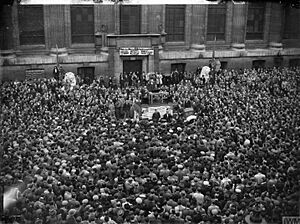
After Adolf Hitler came to power in Germany, the CPGB changed its approach. They decided to work with all groups that opposed fascism. This was called the Popular Front policy. In Britain, they tried to work with the Labour Party.
In the 1935 election, Willie Gallacher became the first Communist Party MP in six years. He represented a coal mining area in Scotland. The CPGB also strongly opposed the British government's policy of appeasement towards Nazi Germany. On the streets, party members fought against Sir Oswald Mosley's British Union of Fascists.
The Second World War (1939–1945)
When World War II started in 1939, the CPGB first opposed it. This was because the Soviet Union and Germany had signed a non-aggression pact. The party saw the war as a conflict between imperialist powers. So, they believed the working class should not take a side. Harry Pollitt, the party leader, disagreed with this view and was removed from his role.
However, in 1941, Germany invaded the Soviet Union. The CPGB immediately changed its stance. They now fully supported the war. They saw it as a fight to defend the Soviet Union against fascism. Harry Pollitt was brought back as Party Secretary. The party then pushed for a "Second Front" in Europe. This would help the Soviet Union and defeat the Axis powers faster. They also discouraged strikes to help increase wartime production.
In the 1945 election, the Communist Party received many votes. Two members were elected to Parliament: Willie Gallacher and Phil Piratin. The party's membership reached its highest point in 1943, with about 60,000 members. However, compared to communist parties in other European countries, it was still quite small. Both Communist MPs lost their seats in the 1950 election.
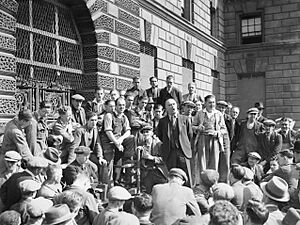
The Cold War Years (1946–1970s)
In 1951, the party released a new plan called The British Road to Socialism. This plan suggested that Britain could become socialist peacefully. This program remained the CPGB's guide until it dissolved in 1991.
From the war years until 1956, the CPGB had a lot of influence in trade unions. Many union officials were party members. They were very strong in the National Union of Mineworkers. They also influenced the Electrical Trade Union.
The party strongly opposed racial segregation and colonialism. In 1954, they published a study on racial discrimination in Birmingham. This helped shape anti-racist politics in Britain.
In 1956, the Soviet Union crushed the 1956 Hungarian Revolution. This caused a huge loss of members for the CPGB. About a quarter to a third of its members left. Many important thinkers also left the party. This event was a major blow to the party's reputation.
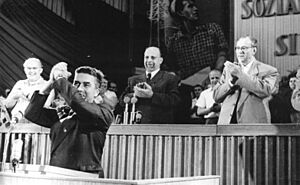
After 1956, the party became more of a pressure group. It tried to use its influence in trade unions to push the Labour Party to the left. Many trade union leaders were CPGB members or supporters. However, the party struggled to win elections. They kept only a few local council seats. Their only representative in Parliament was Lord Milford, who inherited his title in the House of Lords.
In 1966, the Daily Worker newspaper was renamed the Morning Star. Around this time, the party faced internal divisions. Some members wanted to stay close to the Soviet Union. Others wanted the party to be more independent.
In 1968, Soviet forces invaded Czechoslovakia. The CPGB mildly criticized Moscow. They called it an "intervention" rather than an "invasion." This still caused a small split within the party. Those who supported the Soviet actions were sometimes called 'Tankies'. Others in the party started to lean towards Eurocommunism. This was a new way of thinking that was popular in other European communist parties.
By the mid-1970s, the Euro-Communists gained more influence in the party. They were often academics and intellectuals. They were interested in new ideas like environmentalism and feminism. However, there was tension with the party's industrial wing. This group focused on trade union activism. As unemployment grew, the party's membership continued to decline.
Internal Conflicts and Dissolution (1977–1991)
By 1977, disagreements over the party's new plan, British Road to Socialism, caused a major split. Many members who opposed Eurocommunism left. They formed the New Communist Party of Britain. Another group, led by Fergus Nicholson, stayed in the party. They published a paper called Straight Left.
Martin Jacques became the editor of the party's theoretical magazine, Marxism Today. He made it a platform for Eurocommunist ideas. The magazine became popular but was expensive for the small party. By 1983, Jacques felt the CPGB could not be reformed. He stayed mainly because the party funded Marxism Today.
In 1984, a big dispute broke out. The party leadership suspended some members. This led to a group of anti-Eurocommunists forming their own network. In 1988, they officially split from the CPGB. They formed a new party called the Communist Party of Britain. Many saw this as the end of the original party.
In 1991, the Soviet Union collapsed. The Eurocommunist leaders of the CPGB, led by Nina Temple, decided to dissolve the party. They created a new group called the Democratic Left. This was a political think tank, not a party. It later merged with other groups to form Unlock Democracy.
Some Scottish members formed the Communist Party of Scotland. Other former members tried to restart the original CPGB. They are now known as the Communist Party of Great Britain (Provisional Central Committee). However, the Communist Party of Britain is the official Communist Party in the UK recognized by the Electoral Commission.
Party Size and Election Results
The Communist Party of Great Britain started with about 4,000 members. Its membership briefly doubled to over 10,000 during the 1926 general strike. But this growth did not last. By 1930, membership dropped to 2,350.
The party reached its highest membership in 1942, with 56,000 members. This was during World War II, when the party was popular. After the war, membership began to decline. A big drop happened in 1957, when about 6,000 members left. This was after the Soviet intervention in Hungary. The party slowly recovered in the early 1960s but then started shrinking again in 1965. This trend continued until the party dissolved in 1991. At its final meeting, it had 4,742 members.
General Election Results
The CPGB ran candidates in many general elections. They had some success in the 1920s and 1940s, electing a few Members of Parliament. However, their overall share of the national vote remained very small. Over time, their support declined significantly.
| Election year | # of total votes | % of overall vote | # of seats won |
|---|---|---|---|
| 1922 | 30,684 |
0.2% |
1 |
| 1923 | 34,258 |
0.2% |
0 |
| 1924 | 51,176 |
0.2% |
1 |
| 1929 | 47,554 |
0.2% |
0 |
| 1931 | 69,692 |
0.3% |
0 |
| 1935 | 27,177 |
0.1% |
1 |
| 1945 | 97,945 |
0.4% |
2 |
| 1950 | 91,765 |
0.3% |
0 |
| 1951 | 21,640 |
0.1% |
0 |
| 1955 | 33,144 |
0.1% |
0 |
| 1959 | 30,896 |
0.1% |
0 |
| 1964 | 46,442 |
0.2% |
0 |
| 1966 | 62,092 |
0.2% |
0 |
| 1970 | 37,970 |
0.1% |
0 |
| 1974 (Feb.) | 32,743 |
0.1% |
0 |
| 1974 (Oct.) | 17,426 |
0.1% |
0 |
| 1979 | 16,858 |
0.1% |
0 |
| 1983 | 11,606 |
0.0% |
0 |
| 1987 | 6,078 |
0.0% |
0 |
Party Leaders
The Communist Party of Great Britain had several General Secretaries (leaders) during its history. Here is a list of who led the party and when.
| General Secretary (Birth–Death) |
Took office | Left office | Prime Minister (term) |
|
|---|---|---|---|---|
| Albert Inkpin (1884–1944) |
31 July 1920 | July 1928 | Lloyd George 1916–22 |
|
| Law 1922–23 |
||||
| Baldwin 1923–24 |
||||
| MacDonald 1924 |
||||
| Baldwin 1924–29 |
||||
| J. R. Campbell (1894–1969) |
February 1929 | May 1929 | ||
| Harry Pollitt (1890–1960) (1st time) |
July 1929 | October 1939 | MacDonald 1929–35 |
|
| Baldwin 1935–37 |
||||
| Chamberlain 1937–40 |
||||
| Rajani Palme Dutt (1896–1974) |
October 1939 | June 1941 | ||
| Churchill 1940–45 |
||||
| Harry Pollitt (1890–1960) (2nd time) |
June 1941 | 13 May 1956 | ||
| Attlee 1945–51 |
||||
| Churchill 1951–55 |
||||
| Eden 1955–57 |
||||
| John Gollan (1911–1977) |
13 May 1956 | 11 March 1975 | ||
| Macmillan 1957–63 |
||||
| Douglas-Home 1963-4 |
||||
| Wilson 1964–70 |
||||
| Heath 1970–74 |
||||
| Wilson 1974–76 |
||||
| Gordon McLennan (1924–2011) |
11 March 1975 | 13/14 January 1990 | ||
| Callaghan 1976–79 |
||||
| Thatcher 1979–90 |
||||
| Nina Temple (1956–) |
13/14 January 1990 | 23 November 1991 | ||
| Major 1990–97 |
||||
Notable Members
Many people were part of the Communist Party of Great Britain over the years. Here are some of the well-known members:
- Sam Aaronovitch
- Vic Allen
- Surat Alley
- Bill Alexander
- Kingsley Amis
- Robert Page Arnot
- Mark Ashton
- George Alfred Barnard
- Joan Beauchamp
- Kay Beauchamp
- Clem Beckett
- Tom Bell
- Alfreda Benge
- Leila Berg
- J. D. Bernal
- John Biggs-Davison
- Bill Bland
- Anthony Blunt
- Jim Bollan
- Edith Bone
- Bessie Braddock
- Benjamin Francis Bradley
- Laurence Bradshaw
- Noreen Branson
- Peter Brearey
- Maurice Brinton
- Guy Burgess
- Emile Burns
- Alan Bush
- Beatrix Campbell
- John Ross Campbell
- Trevor Carter
- Christopher Caudwell
- Frank Chapple
- Bernard Coard
- Ken Coates
- Rose Cohen
- Dave Cook
- Robert Conquest
- John Cornford
- Maurice Cornforth
- Bob Crow
- Christian Darnton
- Jack Dash
- Hugh Sykes Davies
- Edmund Dell
- George Derwent Thomson
- Maurice Dobb
- Mary Docherty
- Malcolm Dunbar
- Rajani Palme Dutt
- Jessie Eden
- Ben Fine
- Stewart Farrar
- Charles Fletcher-Cooke
- Ralph Winston Fox
- Sid French
- Peter Fryer
- Gerry Gable
- Willie Gallacher
- Green Gartside
- David Gascoyne
- GCT Giles
- Percy Glading
- Robert Griffiths
- David Guest
- J. B. S. Haldane
- Wal Hannington
- Jock Haston
- Denis Healey
- Charlie Hutchison
- Gerry Healy
- Eric Heffer
- Margot Heinemann
- Mike Hicks
- Jim Higgins
- Christopher Hill
- Jeanne Hoban
- Eric Hobsbawm
- David Holbrook
- Edward Hollamby
- Malcolm Hulke
- Allen Hutt
- Douglas Hyde
- Albert Inkpin
- Thomas A. Jackson
- Martin Jacques
- Len Johnson
- Claudia Jones
- David Ivon Jones
- Lewis Jones
- Pat Jordan
- Yvonne Kapp
- Luke Kelly
- Helena Kennedy
- Arnold Kettle
- Pieter Keuneman
- Victor Kiernan
- James Klugmann
- Dorothy Kuya
- Charles Lahr
- John Lawrence
- Norman Le Brocq
- Doris Lessing
- Hyman Levy
- John Lewis
- Sam Lilley
- Eddie Linden
- Jack Lindsay
- James Litterick
- Ewan MacColl
- Hugh MacDiarmid
- Arthur MacManus
- Mick McGahey
- Claude McKay
- Donald Maclean
- Gordon McLennan
- Harry McShane
- Charles Madge
- Cecil L'Estrange Malone
- John Manifold
- Tom Mann
- Carl Marzani
- William Mellor
- Susan Michie
- Ivor Montagu
- A. L. Morton
- Iris Murdoch
- J. T. Murphy
- Andrew Murray
- David Nicholson
- Walton Newbold
- Melita Norwood
- Sanzo Nosaka
- Alan Nunn May
- Sylvia Pankhurst
- William Paul
- Wogan Philipps, 2nd Baron Milford
- Phil Piratin
- Harry Pollitt
- Raymond Postgate
- Annie Powell
- Tom Quelch
- Bert Ramelson
- Jimmy Reid
- John Reid
- Al Richardson
- Edgell Rickword
- Michael Roberts
- Archibald Robertson
- Andrew Rothstein
- George Rudé
- Ralph Russell
- William Rust
- Shapurji Saklatvala
- Raphael Samuel
- John Saville
- Hugh Scanlon
- Stephen Sedley
- Alfred Sherman
- Thora Silverthorne
- Brian Simon
- Roger Simon, 2nd Baron Simon of Wythenshawe
- Derek Simpson
- Cliff Slaughter
- Sue Slipman
- John Maynard Smith
- Michael John Smith
- John Sommerfield
- Ken Sprague
- Philip Spratt
- Hedi Stadlen
- Billy Strachan
- Randall Swingler
- Tilda Swinton
- A. J. P. Taylor
- Michael Tippett
- E. P. Thompson
- Alan Thornett
- Dona Torr
- Philip Toynbee
- David Triesman
- Edward Upward
- Freda Utley
- J. O. N. Vickers
- Alister Watson
- Dorothy Wedderburn
- Sarah Wesker
- Harry Wicks
- Ellen Wilkinson
- Raymond Williams
- Alan Winnington
- Tom Wintringham
- Robert Wyatt
What Does "Tankie" Mean?
The word "Tankie" is a slang term. It was used to describe members of the Communist Party of Great Britain who supported the Soviet Union's actions. Specifically, it referred to those who agreed with the Soviet use of tanks to stop the revolution in Hungary in 1956. Later, it also applied to those who supported the Soviet invasion of Czechoslovakia in 1968.
The term came from a journalist asking a union official about supporting the "tankies." This was after the Soviet tanks entered Hungary. The CPGB's support for the invasion of Hungary hurt its reputation. Interestingly, the CPGB's newspaper, the Morning Star, actually opposed the 1968 invasion of Czechoslovakia. Because of this, the newspaper was banned in countries that were part of the Warsaw Pact.
Today, "tankie" is sometimes used more broadly online. It can refer to anyone on the far-left who supports certain Marxist states. This includes those who might not agree with criticisms about human rights in countries like the former Soviet Union or China.
Images for kids
-
Harry Pollitt speaks to workers in Whitehall, London, 1941.
 | Jewel Prestage |
 | Ella Baker |
 | Fannie Lou Hamer |


